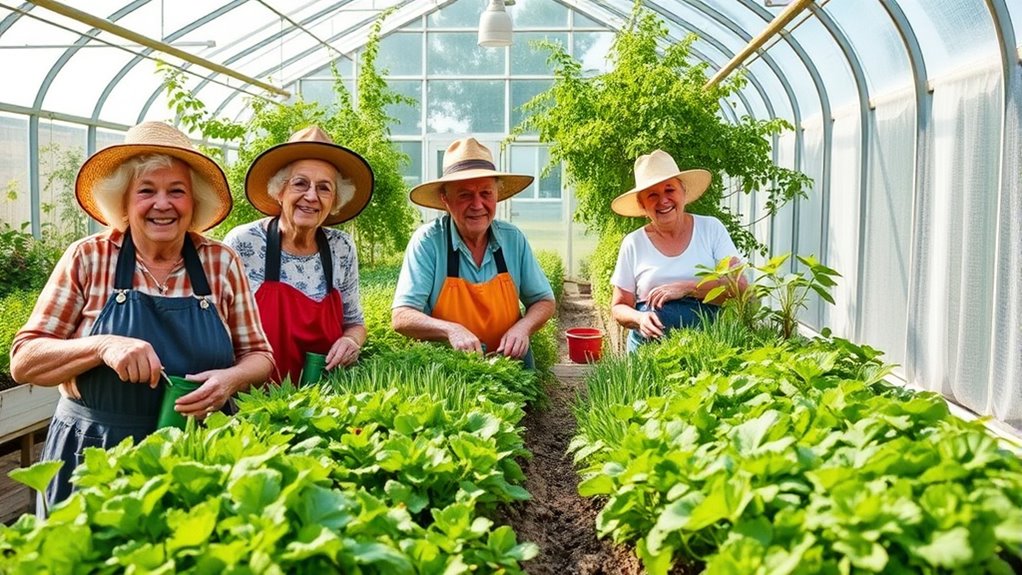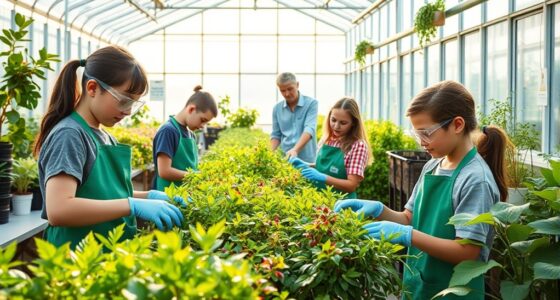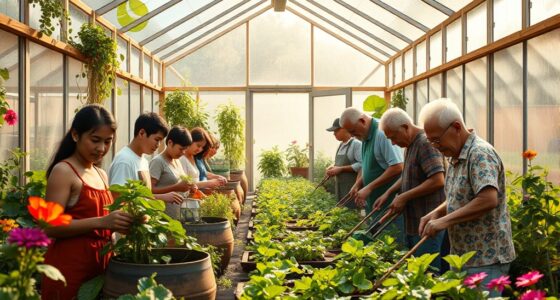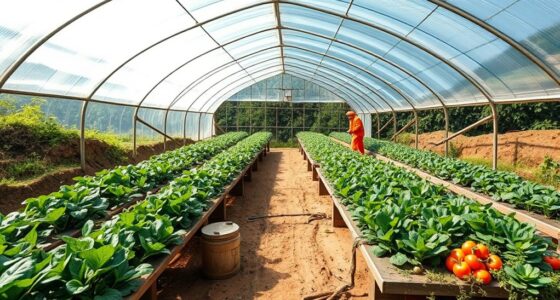Senior citizens are increasingly taking the lead in community greenhouses by sharing their experience to promote sustainable practices like composting and organic gardening. They mentor younger generations, strengthen neighborhood bonds, and serve as eco-ambassadors. Their active involvement fosters community well-being, encourages environmental responsibility, and inspires local policies supporting green initiatives. If you want to discover how their leadership can transform neighborhoods and create lasting change, keep exploring this inspiring movement.
Key Takeaways
- Seniors lead sustainable practices like composting and organic gardening, transforming green spaces into ecological hubs.
- They mentor younger generations, sharing expertise and fostering environmental responsibility through hands-on learning.
- Senior involvement promotes physical activity and social engagement, enhancing their mental and physical well-being.
- Their leadership inspires community support and policies promoting eco-friendly initiatives and intergenerational collaboration.
- Senior-led green projects cultivate a culture of sustainability, strengthening community bonds and environmental stewardship.

Have you ever wondered how senior citizens are transforming their communities? One powerful way they’re making a difference is by leading initiatives in community greenhouses. These green spaces aren’t just about growing plants; they serve as hubs for sustainable practices that benefit everyone. When seniors take charge, they bring a wealth of experience and a commitment to eco-friendly methods, like composting, water conservation, and organic gardening. Their involvement encourages a shift toward more environmentally conscious lifestyles, inspiring others in the neighborhood to adopt sustainable practices. This leadership helps communities reduce their ecological footprint while creating lush, productive spaces that everyone can enjoy.
What makes this movement even more impactful is the role seniors play in fostering intergenerational mentorship. As they share their gardening knowledge and sustainable techniques, they connect with younger generations, passing down valuable skills and life lessons. It’s a two-way street: seniors get to share their wisdom, while kids and teens learn about environmental responsibility firsthand. These interactions help bridge age gaps, build stronger community bonds, and promote a sense of shared purpose. When seniors mentor younger neighbors, they see their experience valued and their contributions essential, which boosts their confidence and sense of belonging. Additionally, leveraging their network connections allows for increased community support and resource sharing, amplifying the impact of their leadership.
Seniors mentoring youth foster bonds, share wisdom, and promote community growth through sustainable gardening and environmental responsibility.
Leading community greenhouses also provides seniors with a meaningful way to stay active and engaged. Instead of feeling isolated or idle, they become crucial contributors to their community’s well-being. Their hands-on involvement in planting, watering, and harvesting keeps them physically active, which is essential for maintaining health and mobility. More than that, working together in a greenhouse fosters social connections, reducing loneliness and creating a sense of camaraderie. It’s a way for seniors to remain vibrant, involved members of their neighborhoods, all while promoting environmental sustainability.
Furthermore, their leadership in greenhouses often inspires local organizations and policymakers to support similar initiatives. As seniors demonstrate the tangible benefits of sustainable practices, they encourage others to replicate these efforts, amplifying the positive impact across the community. Their example underscores how age is no barrier to leadership and innovation. By taking the lead, seniors help shape a more resilient, eco-friendly future—one green space at a time.
In essence, seniors aren’t just planting seeds in community greenhouses; they’re cultivating a culture of sustainability and mentorship that energizes entire neighborhoods. Their involvement exemplifies how age can be a powerful asset in creating lasting change. So, if you’re ever wondering how communities evolve into greener, more connected places, look to the seniors who are leading the way—showing us all that wisdom, when combined with action, can truly transform neighborhoods.
Frequently Asked Questions
How Do Senior Citizens Fund Community Greenhouse Projects?
You can fund community greenhouse projects by exploring various fundraising strategies like organizing fundraising events, seeking donations from local businesses, and launching online crowdfunding campaigns. Don’t forget to research grant opportunities available for community development and environmental initiatives. Applying for these grants can provide substantial financial support. By actively engaging your community and leveraging these strategies, you can secure the funds needed to make your greenhouse project a reality.
What Safety Measures Are in Place for Elderly Volunteers?
Ever wondered how elderly safety is prioritized in community projects? You’ll find volunteer precautions are in place to protect senior citizens, including well-maintained walkways, accessible tools, and safety training. Supervision by experienced staff also guarantees elderly safety, reducing risks of falls or injuries. These measures create a secure environment, so you can confidently participate, knowing your well-being is a top priority during community greenhouse activities.
How Can Seniors Start Their Own Community Greenhouse?
To start your own community greenhouse, focus on urban agriculture and sustainable gardening practices. First, find a suitable location and gather support from neighbors or local organizations. Next, plan your greenhouse layout, secure funding or donations, and obtain necessary permits. By involving others, you can create a thriving space that promotes environmental sustainability and community bonding. Your initiative can inspire others to embrace urban agriculture and sustainable gardening efforts.
Are There Training Programs for Seniors New to Gardening?
Oh, of course, because everyone knows that gardening is just natural for everyone—no training needed. But if you’re new to planting, you’ll find plenty of gardening workshops that cover plant care basics. These workshops are perfect for seniors enthusiastic to learn, offering hands-on experience and expert advice. So, yes, there are training programs designed specifically to help you master gardening skills and grow your green thumb with confidence.
How Do Community Greenhouses Impact Local Food Security?
Community greenhouses boost local food security by supporting urban agriculture and sustainable farming practices. When you get involved, you help grow fresh produce, reduce reliance on external food sources, and strengthen community resilience. These greenhouses create accessible spaces for all ages, encouraging sustainable habits. By participating, you contribute to a healthier, more self-sufficient neighborhood, ensuring fresh food availability and promoting environmental stewardship in your community.
Conclusion
As you see, our wise elders gently guide the way, nurturing both the greenhouses and the spirit of community. Their seasoned hands and kind hearts help the plants flourish and bring everyone closer together. With each seed they tend and each blossom that blooms, they remind us that growth is timeless. In their quiet leadership, you discover that age is just a number, and kindness is the true secret to a thriving, vibrant community.









